
As of January 1st of this year, Penal Code section 1001.95, now allows judges in almost all misdemeanor prosecutions to grant diversion. This means that a judge has the discretion to divert a criminal case, essentially continuing the case without a guilty plea, for up to 24 months to allow the defendant to earn a dismissal. What one must do to earn the dismissal is up to the judge who has wide latitude to craft terms and conditions a defendant must comply with. For this reason, it is important that defense attorneys be creative in crafting a plan for diversion that will meet with judicial approval.
There is a big question as to whether this new judicial diversion is available on DUI prosecutions. The statute itself expressly excludes certain crimes, such as domestic violence and sex crimes. It does not exclude DUIs, which would lead one to believe DUIs may be diverted.
However, Vehicle Code section 23640, a 1998 law sponsored by Mothers Against Drunk Driving, states: “(a) In any case in which a person is charged with a violation of Section 23152 or 23153, prior to acquittal or conviction, the court shall neither suspend nor stay the proceedings for the purpose of allowing the accused person to attend or participate, nor shall the court consider dismissal of or entertain a motion to dismiss the proceedings because the accused person attends or participates during that suspension, in any one or more education, training, or treatment programs, including, but not limited to, a driver improvement program, a treatment program for persons who are habitual users of alcohol or other alcoholism programs, a program designed to offer alcohol services to problem drinkers, an alcohol or drug education program, or a treatment program for persons who are habitual users of drugs or other drug-related programs. (b) This section shall not apply to any attendance or participation in any education, training, or treatment programs after conviction and sentencing, including attendance or participation in any of those programs as a condition of probation granted after conviction when permitted.”
So there is a conflict as VC 23640 expressly forbids pre-plea diversion on DUI charges. Because the legislature did not address this apparent conflict, it is now left up to the courts to sort out the mess. When a writ is taken on a misdemeanor, it goes to the Appellate Division of the county’s Superior Court. Appellate divisions in different counties have split on how they answer the question.
In July, the Los Angeles County Appellate Division held in Espeso, that VC 23640 prevails and DUIs are not eligible for diversion, reasoning that if the legislature had intended DUIs to be eligible for diversion, it would have expressly repealed the prohibition in VC 23640.
That same month, the Riverside County Appellate Division reached the opposite conclusion. In Diaz-Armstrong, the court held that by not expressly excluding DUIs from diversion in PC 1001.95, the legislature expressed its intent that DUIs would be eligible.
It is worth noting that when Governor Newsom signed the bill creating judicial diversion into law he expressed concern about the fact that DUIs were not specifically excluded and indicated he intended to work with the legislature to do so. However, a bill designed to do just that, AB-282 failed to move out of committee by a vote of 3-1 against creating such a specific exclusion. This appears to be further evidence that the legislature intended diversion to apply to DUIs. Hopefully, the legislature will soon make this crystal clear by carving out an exception to the exclusion in VC 23640 for PC 1001.95 diversion.
In the meantime, until the issue is settled with finality, we in the defense bar should continue pursuing diversion for our DUI clients and seeking appellate review when trial courts hold that PC 1001.95 is not applicable to them.
Assembly Bill 3234, effective January 1, 2021, created a statutory basis for Misdemeanor Judicial Diversion. The bill, codified in Section 1001.95 of the Penal Code, essentially empowers any judge to grant diversion of a misdemeanor, without a guilty plea, and without agreement by the prosecuting agency. This is potentially a really big change to criminal law in California.

Client Centered Approach

Reputation by Excellence

Experience

Innovative & Determined

You're Not Just Another Client

AVAILABLE FOR YOU NOW
"*" indicates required fields